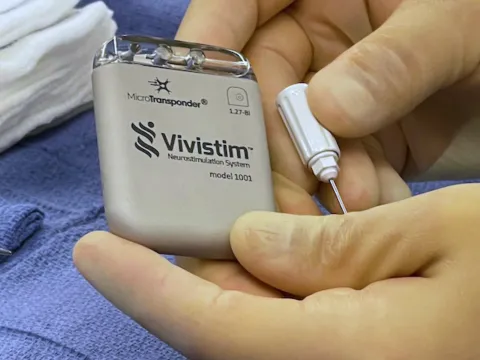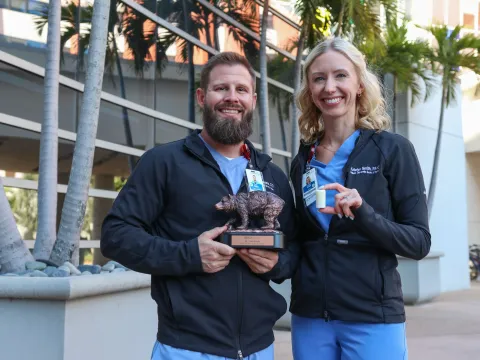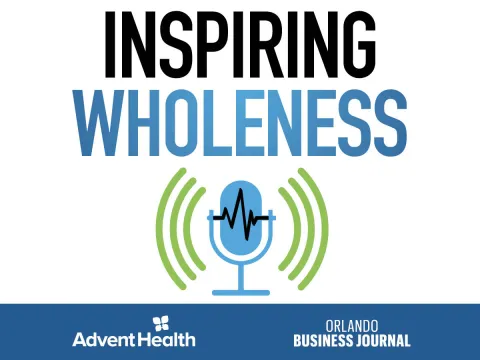- AdventHealth
Physicians and scientists from AdventHealth and BERG recently completed a preprint study on MedRxiv.org that found ondansetron, a long-approved drug to treat nausea, is associated with lower COVID-19 mortality, particularly for patients on a ventilator.

The study is believed to be the first of it’s kind worldwide to use artificial intelligence (AI) to report disease outcomes in COVID-19 patients.
Working together, BERG, a clinical-stage, AI-powered biotech company dedicated to mapping disease and revolutionizing treatments across oncology, neurology and rare diseases, and the AdventHealth Research Institute (AHRI) employed AI analytics on real-world data and gained insights on COVID-19 mortality-associated factors, identifying potential new therapeutic options for COVID-19 patients.

“BERG’s proprietary AI platform, Interrogative Biology, allowed us to look at extremely large datasets in a short period of time and with more accuracy than the human brain,” said Steven R. Smith, MD, chief scientific officer and senior vice president of AdventHealth. “This platform can also sort the data to identify predictors of clinical outcomes. In this case, BERG’s AI found that one drug linked thousands of patients together and showed the drug had a positive impact on COVID-19 mortality.”
From January to December 2020, the organizations collaborated to analyze electronic health records from AdventHealth facilities across seven Central Florida counties in 2020.

“Through BERG’s relationship with Oak Ridge National Laboratory, their supercomputer and the work of Dr. Jeremy Smith and his team, we were able to turn a large amount of medical data – nearly 280,000 electronic health records including more than 16,000 COVID-19 patients – much more quickly into an accurate model of patient biology for this study,” said Niven R. Narain, Ph.D., co-founder, president and CEO of BERG.
The analysis searched for drugs, co-morbidities and other factors such as lab results that were associated with death from the virus. Researchers identified ondansetron (Zofran) as the only medication associated with decreased mortality in this cohort.
“When the data came back, this drug stood out from all of the other potential factors,” said Smith. “This work provides evidence that ondansetron may be useful, although these results should be replicated by looking at other large datasets, or better still, by conducting a randomized clinical trial.”
Ondansetron is a selective serotonin receptor antagonist and may turn down an overactive immune system which is known to occur in some patients with severe COVID-19.
This study also corroborated two findings from previous studies:
- In one study, Remdesivir, the first approved drug for COVID-19 treatment, does not have a clear effect on reducing mortality.
- In another study, Tocilizumab, a drug to treat rheumatoid arthritis is associated with lower COVID-19 mortality for mechanically ventilated patients.
AdventHealth and BERG began working together in 2020 to harness the power of AI, discovering new insights related to COVID-19 mortality and identifying currently used medications that could be repurposed for this disease. This study demonstrates how real-world data analysis can generate valid insights that could possibly support clinical decision-making and minimize the future loss of lives and resources.
“This is a key step forward in the scientific process,” said Smith. “For researchers, repurposing a drug for this virus and other inflammatory conditions could be a gamechanger.”
“BERG was honored to partner alongside the team at AdventHealth and to have the opportunity to develop this groundbreaking research through our combined clinical excellence,” said Narain. “It is our hope that this study is only the first of its kind and will transform how future research studies are done by providing real-time access to data, ultimately reducing the drug research timeline and saving lives.”
The AdventHealth Research Institute develops and conducts world-class translational research across multiple institutes and clinical departments. AHRI often collaborates with companies and organizations, like BERG, to drive change and advocate for better patient outcomes.
Recent News

The AdventHealth Neuroscience Institute is the first in Florida and one of the first in the country to begin recruiting patients with primary progressive or non-active secondary progressive multiple...

Accurately determining food intake remains a challenge in nutrition research. A new study published in Nature Metabolism and co-authored by Dr. Corbin introduces a metagenomics-powered approach to...

Discover what’s being accomplished in Central Florida to bridge the health gap with Orange County Mayor Jerry Demings and AdventHealth’s Dr. Alric Simmonds.

Breakthrough device offers new hope for stroke survivors struggling with rehabilitation following ischemic stroke

Jennifer Seminerio, MD, recently became one of the first in Florida to use intestinal ultrasound (IUS) to help assess and manage treatment of patients with inflammatory bowel disease (IBD). A non...

The Convergent Hybrid Ablation procedure has been gaining acceptance as an effective treatment option for long-standing persistent atrial fibrillation (AFib) since the CONVERGE trial data published in...

Recently, AdventHealth for Children pediatric orthopedic surgeon Sean Keyes, DO, Katelyn Smith, PA-C, and their team performed their 100th bridge-enhanced anterior cruciate ligament (ACL) repair (BEAR...

Physician leaders from AdventHealth’s emergency department, infectious disease, inpatient, pediatrics and pharmacy teams all collaborated to develop a respiratory virus testing algorithm to assist...

Thoracic surgeon Colleen Gaughan, MD, and her team at AdventHealth Celebration, recently became one of the first in the country to incorporate targeted imaging agent Cytalux (pafolacianine) as part of...

On the newest Inspiring Wholeness podcast, Obie Diaz, local morning radio show host, shares how a routine physical eventually led to two open heart surgeries.

AdventHealth recently began piloting a new Genomics Risk Assessment for Cancer and Early Detection (GRACE) program that combines the use of digital mammography, artificial intelligence (AI) technology...

AdventHealth Clinical Research Unit (CRU) Executive Director and Medical Director of Genitourinary Oncology Guru Sonpavde, MD, co-authored an article on the AMBASSADOR Phase III clinical trial results...
